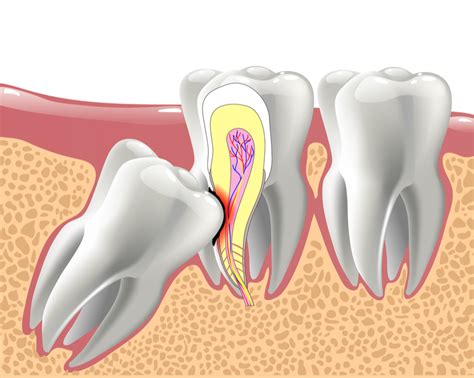Please Visit the Forms Page for all Consent Forms
Wisdom teeth, also known as third molars, are the last teeth to erupt in the mouth.
 This generally occurs between the ages of 17 and 25, a time of life that has been called the “Age of Wisdom. Anthropologists note that the rough diet of early humans resulted in the excessive wear of their teeth. Normal drifting of the teeth to compensate for this wear ensured that space was available for most wisdom teeth to erupt by adolescence. Changes in diet to softer foods of modern day have reduced the normal drifting which often results in limited space in the back of the mouth where wisdom teeth normally erupt.
This generally occurs between the ages of 17 and 25, a time of life that has been called the “Age of Wisdom. Anthropologists note that the rough diet of early humans resulted in the excessive wear of their teeth. Normal drifting of the teeth to compensate for this wear ensured that space was available for most wisdom teeth to erupt by adolescence. Changes in diet to softer foods of modern day have reduced the normal drifting which often results in limited space in the back of the mouth where wisdom teeth normally erupt.
Why Should I Remove My Wisdom Teeth?
Wisdom teeth are the last teeth to erupt within the mouth. When they align properly, and gum tissue is healthy, wisdom teeth do not have to be removed. Unfortunately, this does not generally happen. The extraction of wisdom teeth is necessary when they are prevented from properly erupting within the mouth. They may grow sideways, partially emerge from the gum, and even remain trapped beneath the gum and bone. Impacted teeth can take many positions in the bone as they attempt to find a pathway that will allow them to erupt successfully. These poorly positioned impacted teeth can cause many problems. When they are partially erupted, the opening around the tooth allows bacteria to grow and will eventually cause an infection. The result: swelling, stiffness, pain and illness. The pressure from the erupting wisdom tooth may move other teeth and disrupt the orthodontic or natural alignment of teeth. The most serious problem occurs when tumors or cysts form around the impacted wisdom tooth, resulting in the destruction of the jawbone and healthy teeth. Removal of the offending impacted tooth or teeth usually resolves these problems. Early removal is recommended to avoid such future problems and to decrease the surgical risk involved with the procedure.
Oral Examination
With an oral examination and x-rays of the mouth, our doctors can evaluate the position of the wisdom teeth and predict if there may be present or future problems. Studies have shown that early evaluation and treatment result in a superior outcome for the patient. Patients are generally first evaluated in the mid- teenage years by their dentist, orthodontist or by an oral and maxillofacial surgeon. All outpatient surgery is performed under appropriate anesthesia to maximize patient comfort. Our doctors have the training, license and experience to provide various types of anesthesia to allow patients toselect the best alternative. These services are provided in an environment of optimum safety, utilizing modern monitoring equipment and staff experienced in anesthesia techniques.
Surgery
In most cases, the removal of wisdom teeth is performed under local anesthesia, laughing gas (nitrous oxide/oxygen analgesia) or general anesthesia. These options as well as the surgical risks will be discussed with you before the procedure is performed. Following surgery, you may experience some swelling and mild discomfort, which are part of the normal healing process. Cold compresses may help decrease the swelling, and medication prescribed by your Oral and Maxillofacial Surgeon can help manage the discomfort. You may be instructed to modify your diet following surgery and later progress to more normal foods. If you have any questions, please do not hesitate to contact us.
Our services are provided in an environment of optimum safety that utilizes modern monitoring equipment and staff that are experienced in anesthesia techniques.

